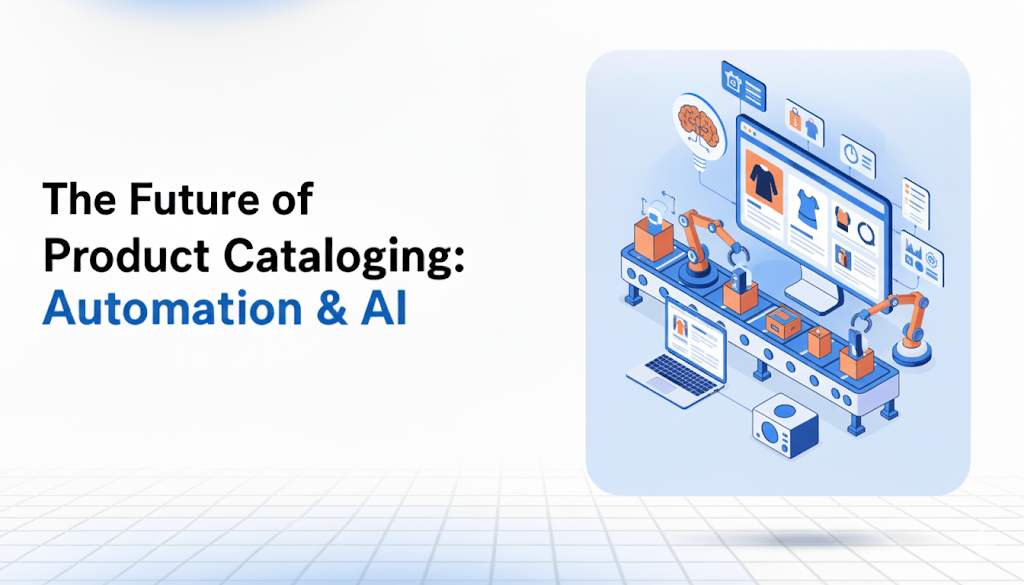
In ecommerce, a product catalog isn’t just a database, it’s the digital storefront customers interact with before making a purchase. But as product lines grow and online marketplaces multiply, managing catalogs manually becomes inefficient and error-prone. That’s why businesses are increasingly turning to AI catalog automation.
AI is no longer just a buzzword; it’s actively reshaping how product data is created, enriched, and delivered across platforms. If you’d like a deeper look at how AI has already changed catalog workflows, check out our insights on AI’s impact on catalog content. That article explores the current state, while this one looks at the future.
Why Traditional Cataloging Holds Businesses Back
Manual cataloging creates bottlenecks that limit growth:
- Inconsistent product data across multiple channels.
- Time-consuming onboarding for new SKUs.
- Poor SEO visibility due to generic or duplicated descriptions.
- Higher return rates when product information is incomplete or inaccurate.
These challenges highlight why ecommerce brands must adopt smarter cataloging strategies.
The Rise of AI Catalog Automation
AI catalog automation brings efficiency and accuracy into catalog management. Instead of relying on human input for every product detail, AI systems can:
- Automatically assign categories and attributes.
- Generate SEO-rich product descriptions in seconds.
- Extract features like color, material, or size from images.
- Sync updates instantly across sales channels.
By minimizing human errors and speeding up workflows, AI allows businesses to focus more on strategy and customer experience.
Automated Product Listing for Ecommerce
Scaling catalogs manually is unsustainable. Automated product listing for ecommerce helps retailers:
- Launch new SKUs quickly across multiple marketplaces.
- Keep product data consistent on Amazon, Shopify, and Magento.
- Localize descriptions for different regions and languages.
- Apply SEO best practices automatically to maximize visibility.
This shift from manual to automated cataloging ensures that businesses can grow without being held back by operational inefficiencies.
Cataloging Tools with AI: From Automation to Intelligence
The next stage isn’t just automation, it's intelligence. Modern cataloging tools with AI offer features such as:
- AI-powered tagging that ensures accurate classification.
- Personalized product recommendations driven by customer behavior.
- Demand forecasting that prioritizes which products to highlight.
- Performance analytics that continuously improves listings.
These tools don’t just speed up cataloging; they actively enhance the customer journey and drive conversions.
Future-Proofing Ecommerce with AI
The future of ecommerce won’t just be about larger catalogs — it will be about smarter catalogs. Businesses adopting AI will enjoy:
- Faster product discovery for customers.
- Lower operational costs through reduced manual work.
- Higher SEO rankings via AI-optimized metadata.
- More agile scaling when entering new markets.
Simply put, AI ensures that catalogs grow intelligently rather than chaotically
FAQs
1. What is AI catalog automation?
AI catalog automation is the use of artificial intelligence to streamline catalog management processes like product categorization, description generation, and image tagging. It reduces manual effort and improves accuracy.
2. How does automated product listing for ecommerce benefit businesses?
Automated product listing allows retailers to upload and update products across multiple platforms instantly, ensuring consistency, reducing errors, and speeding up go-to-market timelines.
3. Are cataloging tools with AI suitable for small businesses?
Yes. Many AI cataloging tools are scalable, meaning small businesses can start with basic features and expand as they grow. This helps even smaller retailers maintain professional, optimized catalogs.
4. What makes an AI-driven cataloging solution better than traditional methods?
AI-driven cataloging solutions not only automate repetitive tasks but also provide intelligence, such as predictive analytics, personalization, and SEO optimization, giving businesses a competitive edge.
Conclusion: Why Businesses Need to Act Now
As customer expectations rise, outdated cataloging processes will only hold brands back. AI catalog automation, automated product listing for ecommerce, and cataloging tools with AI are no longer optional add-ons, they’re critical for survival in competitive markets.
If you’re ready to explore how these innovations can transform your business, take a closer look at our AI-driven cataloging solution for ecommerce. It’s designed to simplify catalog management, improve customer experiences, and future-proof your digital storefront.
Related articles
business enquiry
business enquiry




.png)